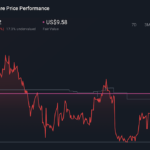
U.S. stock-futures traded sharply lower in early Monday, joining a global equity selloff, as the spread of COVID-19 beyond China raised worries that global economic growth could take a hit.
What are major indexes doing?
Dow Jones Industrial Average futures YM00, -3.14% fell 892 points, or 3.1%, to 28,089, suggesting a steep drop when U.S. trading starts kicks off. S&P 500 futures ES00, -3.08% fell 100.55 points, or 3%, to 3,238.75 and Nasdaq-100 futures NQ00, -3.44% dropped 322 points, or 3.4%, to 9,136.
See: All 30 Dow stocks are falling ahead of the open, led by Apple
Stocks fell Friday, leaving major indexes with weekly losses. The Dow ended the week down 1.4%, while the S&P 500 saw a 1.3% decline. The Nasdaq Composite shed 1.6%.
What’s driving the market?
“The number of confirmed coronavirus cases outside of China continued to multiply over the weekend, sending shivers across financial markets as investors were forced to reassess their view that the impact of the outbreak will likely be short-lived,” said Raffi Boyadjian, senior investment analyst at XM, in a note.
Authorities in northern Italy canceled some public events, including Venice’s Carnival, in an effort to reduce the spread of the virus. Italian officials said Sunday they have 152 confirmed cases, the most in any country outside Asia. European stock markets fell sharply at the open, with the FTSE MIB Italy index I945, -5.53% slumping over 5%.
South Korea reported 70 more cases and Iran said the death toll from the city of Qom is 50.
On Saturday, the International Monetary Fund warned the virus outbreak could reduce global economic growth by 0.1% this year, and drag China’s annual growth 0.4 percentage points lower than January estimates.
“The world economy is facing a clear slowdown and this slowdown might be reinforced by the so-called coronavirus,” French Finance Minister Bruno Le Maire said at a G-20 finance meeting in Saudi Arabia, according to the Associated Press.
But U.S. Treasury Secretary Steven Mnuchin said Sunday that it was still too early to tell how the outbreak will affect the global economy. “I think we’re going to need another three or four weeks to see how the virus reacts, until we really have good statistical data,” he told CNBC.
Still, the global spread of the virus in patients with no links to China suggests “things are about to get extremely problematic, and market conditions could get exponentially worse this week,” Stephen Innes, chief market strategist with AxiTrader, wrote in a note Sunday.
South Korea’s Kospi 180721, -3.87% sank 3.8% in Monday trading as the country went on high alert to contain the spread of the COVID-19 coronavirus. More than 760 people in South Korea have been infected, with most of the diagnoses coming in the past few days. Under the new alert level, the government has the authority to order schools to be closed, stop public transportation and to cut off flights to and from South Korea.
Australia’s S&P/ASX 200 XJO, -2.25% closed down 2.2%, and stocks fell 1.6% in Hong Kong HSI, -1.79%, though the Shanghai Composite SHCOMP, -0.28% lost just 0.2%. Japan’s Nikkei is closed Monday for a holiday.
Crude oil prices fell as well, with West Texas Intermediate crude for April delivery CLJ20, -4.89% and April Brent crude BRNJ20, -4.67%, the global benchmark, each down well over 4%.
Gold prices GCJ20, +2.13% surged by $31 an ounce to $1,679.70.
See: Why the coronavirus outbreak is delivering a fresh dose of recession fear to the stock market
China’s President Xi Jinping on Sunday noted the outbreak news was “grim,” but said measures must be taken to get China’s economy going again, including reopening factories in low-risk areas. Experts forecast as much as a 1% reduction in China’s economic output this quarter due to strict quarantines that closed businesses and factories.
Chinese officials again reported fewer than 1,000 new cases Sunday, though the overall total in mainland China is nearly 77,000 infected with more than 2,400 deaths.
Read: Businesses get bigger butterflies over coronavirus and that’s not good for the economy
What’s on the economic calendar?
The economic calendar was light on Monday. The January reading of the Chicago Federal Reserve Bank’s national activity index rose to -0.25, from -0.51 in the previous month. Cleveland Fed President Loretta Mester is scheduled to deliver remarks at 3 p.m. Eastern.
div > iframe { width: 100% !important; min-width: 300px; max-width: 800px; } ]]>







